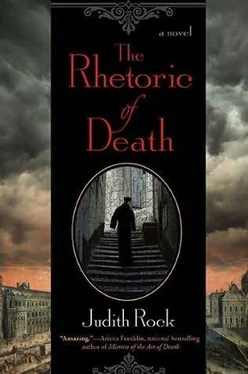Judith Rock - The Rhetoric of Death
Здесь есть возможность читать онлайн «Judith Rock - The Rhetoric of Death» весь текст электронной книги совершенно бесплатно (целиком полную версию без сокращений). В некоторых случаях можно слушать аудио, скачать через торрент в формате fb2 и присутствует краткое содержание. Жанр: Исторический детектив, на английском языке. Описание произведения, (предисловие) а так же отзывы посетителей доступны на портале библиотеки ЛибКат.
- Название:The Rhetoric of Death
- Автор:
- Жанр:
- Год:неизвестен
- ISBN:нет данных
- Рейтинг книги:3 / 5. Голосов: 1
-
Избранное:Добавить в избранное
- Отзывы:
-
Ваша оценка:
- 60
- 1
- 2
- 3
- 4
- 5
The Rhetoric of Death: краткое содержание, описание и аннотация
Предлагаем к чтению аннотацию, описание, краткое содержание или предисловие (зависит от того, что написал сам автор книги «The Rhetoric of Death»). Если вы не нашли необходимую информацию о книге — напишите в комментариях, мы постараемся отыскать её.
The Rhetoric of Death — читать онлайн бесплатно полную книгу (весь текст) целиком
Ниже представлен текст книги, разбитый по страницам. Система сохранения места последней прочитанной страницы, позволяет с удобством читать онлайн бесплатно книгу «The Rhetoric of Death», без необходимости каждый раз заново искать на чём Вы остановились. Поставьте закладку, и сможете в любой момент перейти на страницу, на которой закончили чтение.
Интервал:
Закладка:
“When you get back tonight, maitre, put him in the stable here. I’ll return him tomorrow.” Fabre raised an admonitory finger. “Now remember. Cross the river on the Pont de la Tournelle, not the Petit Pont-”
“Pere Le Picart made me memorize the directions. St. Anthony must have told him how lost I got coming home the other day. My thanks for fetching the horse, mon frere, and a peaceful night to you.”
“And to you. If you stay away from cats.”
Charles clucked to the nameless horse and rode away down the lane, thinking that cats were going to be the least of his worries. But the sky seemed to be clearing again, that was something. And when the lane met the rue St. Jacques and he turned toward the river, he saw that the wind had dropped enough to let the long shop signs hang quiet on their poles. The Latin Quarter’s shops and the ramshackle vendors’ booths scattered along side streets were closing. Belated shoppers darted like rabbits, seeking things forgotten earlier, their demands for cheap end-of-the-day prices-and complaints when their demands were refused-shrill above the rumble of carriage wheels. Charles’s eye was caught by a sign painter on a ladder, finishing a silver spoon on a scarlet ground.
“Pewterer or roast shop, mon ami?” he called out.
“Best roast shop in Paris! We open tomorrow, come and try the garlic mutton!”
Charles’s horse shied in protest as an onslaught of released day students pelted down the hill from Louis le Grand, Plessis, Cambray, and Gervais. Their game of stealing each other’s hats grew into armed conflict as one group of scholars fired a volley of gutter refuse at its rivals. Charles ducked and reined his horse aside to avoid a flying bunch of rotting carrots, and the horse’s hooves just missed a stack of small gleaming boxes outside a joiner’s shop. The joiner’s shock-haired apprentice ran out, yelling abuse, and belatedly gathered up his master’s wares.
Glad to escape the fray, Charles turned into little rue Galande, past the ancient church of St. Julien the Poor. A clutch of the modern poor darted from the shelter of its doors, proffering bloody bandages, sores, and a sleeping swaddled infant. Charles suspected that the bandages and sores were works of art, not nature, but the thin, vacant-eyed woman holding the baby wrung his heart. Praying that Pernelle and Lucie were not in want, he gave her a handful of copper gros from the purse Le Picart had given him to use if he needed. For expenses, Charles supposed. Or bribes. Le Picart hadn’t said.
He was nearly at the Pont de la Tournelle when he rode into a tiny square and found himself in one of those spaces of quiet all cities hold. The cacophony of Paris faded and a cascade of song poured from an open window, somehow deepening the hush. “Thick forest,” the singer lamented, “you cannot conceal my unhappy love…” Doves cooed from a walled garden and Charles breathed in the scent of flowers. It came to him that all this-the city, being on his own with money to spend, no vow of obedience, nothing to curb his choices-could be his ordinary life if he left the Society.
Not money to spend, he corrected himself. Since their father’s death, his older brother, Rene, had run the family land, selling the olives, wine, and figs, collecting his seigneurial dues, even overseeing his small seigneurial court in person, which was somewhat unusual these days. But prices had fallen and the land barely kept Rene’s family and Charles’s mother in modest comfort. If Charles left the Society, he would be on his own. He supposed he could support himself teaching. Though Paris schools expected their teachers to be, if not clerics, at least single. And he might not stay in Paris. Or stay single… Turning away from where that thought tried to take him, he told himself he could earn a living as a dancing master. If he could find students who liked the wailing of amorous cats, which was what his violin playing sounded like. Or a theatre company might take him on. He’d proved that he could still dance, and his heart leapt at the thought of performing. He was old, though, to turn professional; and his shoulder was permanently stiff, outright painful if he overused it. But he also acted well enough, and acting would be easier on his shoulder…
His imaginings carried him across the Pont de la Tournelle to the Ile St. Louis-the Ile Notre Dame, as some still called it-where wooden cranes and piles of stone and lumber testified to the ongoing lure of this island, created for the rich. As he reached the Right Bank, the slowly fading light recalled him to his evening’s business. He would have to get himself presented to whoever was representing the Prince of Conde. But he was increasingly sure that the key to the murders was in Paris, not away in Chantilly. His main goal tonight was learning as much as possible about Guise’s life outside the college. Though how to do that with Guise’s gimlet stare following his every move, he didn’t know. His spirits sank abruptly as he turned along the wide rue St. Antoine. What skills did he really have for this? His mother had often said that he could talk the horns off a brass goat when he wanted to. And he could act. Fighting, dancing, and directing had taught him to read bodies and their intentions-a useful skill when facing angry men, but he was going to an urbane soiree in a Jesuit house, not a street fight. So acting and talking the horns off a brass goat would be tonight’s weapons of choice.
A tall fountain in the middle of the street made him shove his worries aside and look eagerly for the Society’s new church of St. Louis. Just by St. Catherine’s fountain, Le Picart had said, and there it was. Charles slowed his horse to a walk, drinking in the pale honey stone facade, craning his neck to follow the graceful curves soaring into the evening sky like a Mass’s Gloria. Patterned after the Jesuits’ great Gesu in Rome, St. Louis was exuberantly carved, painted, niched, and scrolled. Even the enormous clock over the church porch was gorgeous, its face surrounded by a golden sunburst. Charles was suddenly as glad to be brother to those who made such extravagant beauty for God, as glad to be making his own small contribution to such beauty in the ballets, as he’d been just moments ago to imagine himself uncassocked and his own man in the way of ordinary men.
Mentally throwing up his hands at his own inconstancy, Charles nudged the horse to a trot and left the church behind. What do You want, he demanded silently of God. I feel more like a shuttlecock every day. Is that what I am? A toy for You and the devil to knock back and forth between you? And which side is Yours? Is it better to walk away from the Society and its sins of power? Or to stay and try for some power myself and hope to lessen the sins? Or is it better to leave the sins to You and get on with the good the Society does? I cannot just tell myself piously that all things work together for good and leave off thinking! He waited, but this time his sparring didn’t deepen into prayer.
The sunset reddened behind him and the ancient bulk of the Bastille loomed ahead. No longer in the mood for sight-seeing, he passed it unheeding. He rode through the medallion-encrusted Arc de triomphe that had replaced the St. Antoine gate, across the stinking sewage ditch running along the line of the old wall, and took out his feelings in riding harder than he needed to through the gathering dusk. When he turned east and left the ditch behind, he pulled the horse to a trot. He was in real countryside now, passing canvas-sailed windmills, a tiny village, fields ripening toward haying, patches of woods. The road rose gently and he rode into the spacious courtyard of a stone house whose windows shone yellow against a sheltering hill.
A chorus of loud voices and laughter from the stable suggested a lively game of dice among grooms and escorts passing the time until they were needed again, and beside the stable door, two men nearly as tall as Charles, with pistols at their belts, stood talking. The unfamiliar cadence of their words thudded against Charles’s ears as he dismounted. English, he thought in surprise, and handed his reins to the stable boy who came to meet him.
Читать дальшеИнтервал:
Закладка:
Похожие книги на «The Rhetoric of Death»
Представляем Вашему вниманию похожие книги на «The Rhetoric of Death» списком для выбора. Мы отобрали схожую по названию и смыслу литературу в надежде предоставить читателям больше вариантов отыскать новые, интересные, ещё непрочитанные произведения.
Обсуждение, отзывы о книге «The Rhetoric of Death» и просто собственные мнения читателей. Оставьте ваши комментарии, напишите, что Вы думаете о произведении, его смысле или главных героях. Укажите что конкретно понравилось, а что нет, и почему Вы так считаете.












